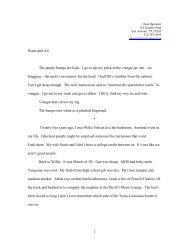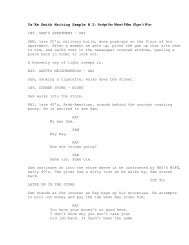Title: “Departure” Genre: Fiction (excerpt from a short story) Date: 7 ...
Title: “Departure” Genre: Fiction (excerpt from a short story) Date: 7 ...
Title: “Departure” Genre: Fiction (excerpt from a short story) Date: 7 ...
You also want an ePaper? Increase the reach of your titles
YUMPU automatically turns print PDFs into web optimized ePapers that Google loves.
<strong>Title</strong>: <strong>“Departure”</strong><br />
<strong>Genre</strong>: <strong>Fiction</strong> (<strong>excerpt</strong> <strong>from</strong> a <strong>short</strong> <strong>story</strong>)<br />
<strong>Date</strong>: 7/27/08<br />
Author: Andrew Porter<br />
Other Relevant Information: This <strong>story</strong> was first published in The Ontario Review, then<br />
later anthologized in the anthologies The Pushcart Prize: Best of the Small Presses 2008<br />
and You Must Be This Tall to Ride: Stories on Growing up and Essays by the People Who<br />
Wrote Them (forthcoming 2009). It will also be broadcast nationally on NPR’s Selected<br />
Shorts this fall. Please note that this is just an <strong>excerpt</strong> <strong>from</strong> the <strong>story</strong>. The <strong>story</strong> in its<br />
entirety is 17 pages.
Departure<br />
That spring we were sixteen Tanner and I started dating the Amish girls out on the<br />
rural highway—sometimes two or three at the same time, because it wasn't really dating.<br />
There was no way of getting serious.<br />
This was in 1992, over ten years ago, and things had not yet begun to change in<br />
our part of Pennsylvania. I think of that year as a significant one now, a turning point in<br />
our county, the first year the town of Leola started growing and becoming a city and also<br />
the first year the Amish started leaving, selling their property and heading west toward<br />
Indiana and Iowa.<br />
There had been several cases of runaways among the Amish that year—mostly<br />
young men, barely in their twenties, tempted by the shopping malls and bars popping up<br />
along the highways near their farms. Leola was expanding quickly then, it was becoming<br />
more common, and it worried the elders in the Amish community. And I think it explains<br />
why that spring some of the Amish teenagers were given permission to leave their farms<br />
for a few hours on Friday nights.
Out on the other side of town there was an intersection on the rural highway<br />
where they would go to hang out. It was a remote area. A strip mall with a K-Mart sat on<br />
one side of the intersection and across the road there was a twenty-four hour diner. You<br />
would sometimes see them on Friday evenings traveling in a long line like a funeral<br />
procession, their buggies hugging the shoulder of the road as tractor-trailers rubbered by.<br />
They would park out of sight behind the K-Mart, tie their horses to lamp posts or the<br />
sides of dumpsters, and then the younger ones would go into the K-Mart to play video<br />
games and the older and more adventurous would cross the street to the diner.<br />
The diner was a family-style place, frequented only by local farming families and<br />
truckers, and it was usually empty. Inside, the Amish kids would immediately disappear<br />
into the bathrooms and change into blue jeans and T-shirts that they had bought at K-<br />
Mart, clothes which never seemed to fit their bodies right. Then they would come out,<br />
their black wool clothes stuffed into paper bags, and order large platters of fried food and<br />
play country songs on the juke boxes, and try to pretend they weren't Amish.<br />
That spring Tanner and I had begun stopping by just to see them. We never<br />
bothered them, just watched. And it never occurred to us that there might be something<br />
unnatural about what we were doing, or even wrong. We were simply curious. We<br />
wanted to know if the rumors we had heard in school were true: that there were<br />
spectacular deformities to be found among the Amish, that few of the children possessed<br />
the correct number of fingers, the results of extensive inbreeding.<br />
We would sit in a booth at the far end of the diner and glance at them <strong>from</strong> behind<br />
our menus. We were amazed to hear them curse and see them smoke cigarettes. Some of<br />
them even held hands and kissed. Sometimes other people, people <strong>from</strong> town like us,
would stop by, just to watch—and you could tell that it worried them. People were still<br />
scared of the Amish then, they were still a mystery and a threat because of their wealth<br />
and the tremendous amount of land they owned—and so naturally they were disliked,<br />
treated as outsiders and freaks.<br />
At eleven o'clock, they'd change back into their clothes and very politely pay their<br />
checks. Then they'd cross the street in a big group, climb back into their buggies and<br />
leave. And Tanner and I would stand out in the diner parking lot and watch them, still not<br />
believing what we had seen, but also somehow sad to see them go.<br />
Once the other kids at school found out about the diner, they started coming<br />
regularly in their jeeps and BMWs—not to watch like Tanner and I—but to mock and<br />
torment. It was cruel and it saddened us to see, though we never once tried to stop it.<br />
Instead we sat back in the corner and watched, angry, but also privately relieved that for<br />
once it was not us who were being teased or beat up. In the midst of targets so uncool and<br />
vulnerable as Amish teenagers, the popular kids seemed to have practically forgotten us.<br />
There was one Amish kid who looked older than the rest. He could have been in<br />
his twenties. Tanner and I had noticed him the very first night because of his size and<br />
because of his face which always looked angry. He came every week with the rest of<br />
them, but always sat off by himself in a separate booth, smoking cigarettes and punching<br />
heavy-metal songs into the juke box at his table.<br />
His anger scared us more than the others. That and his size. He had the body of a<br />
full grown man, a laborer—his shoulders broad, forearms solid and bulging out near his<br />
elbows.
When the fights started he was always involved. They usually happened out by<br />
the dumpsters in back of the diner. The odds were never even: always five or six against<br />
one. Having been raised strict pacifists, almost none of the Amish would fight. But he<br />
would. And despite his size he would, of course, always lose—though he'd last longer<br />
than anyone would believe, moving with the grace of a young boxer, gliding, ducking.<br />
His style was to stay low and bring his punches up <strong>from</strong> way down under. He was quick,<br />
had a powerful jab, and knew how to protect himself. But the beauty of his moves never<br />
lasted long. Inevitably he'd lose his focus, turn his back or look away for a second, and<br />
there would be a pile-on.<br />
A few minutes later, his face cut up and swollen, he'd retreat across the street to<br />
K-Mart, followed by the rest of the Amish teenagers. And the next week, to everyone's<br />
surprise, he'd be back again—not even bitter about it, just sitting there at the edge of the<br />
booth, waiting.<br />
It wasn't until late April that Tanner and I started dating the girls, but like I said, it<br />
wasn't really dating. They were all extremely shy and there wasn't a whole lot of common<br />
ground. Mostly we would ask them questions about their lives, and they would nod or<br />
shake their heads and giggle, and then we would sit and watch as they nervously stuffed<br />
their faces with cheeseburgers.<br />
Later, we would walk them back across the street to K-Mart, and then sometimes,<br />
if no one else was around, they would kiss us in the shadows. And then—almost like it<br />
never happened—they'd be gone again and we'd have to wait a whole week. Sometimes
they'd never come back, and we wouldn't know why. We couldn't exactly call them up.<br />
Usually we didn't even know their names. So if they didn't show the next week, we'd try<br />
to meet two new ones.<br />
Back at our school, pretty girls wouldn't look at us. We were unexceptional—<br />
failures at sports and our fathers didn't manage banks or practice Orthopedic medicine.<br />
But out on the rural highway we dated the most beautiful of the Amish girls. They were<br />
attracted to our foreignness; and we, to theirs.<br />
At school, there were jokes about us naturally. Mainly inbreeding jokes. Someone<br />
had heard that our girlfriends had two heads, three nostrils, tails coming out of their<br />
backbones. It was almost summer and so we tried to ignore it, ride it out, though it made<br />
us think about what we were doing.<br />
And it was not right, what we were doing. We were aware of that. And in a way<br />
we were still scared of the Amish. Even the girls. There was something unnatural about<br />
them. It's hard to explain: they would only let you so close—and it was always in private<br />
where no one could see. Sometimes they would kiss you and then run away, or else you<br />
would be thinking about making a move, not even doing anything, and they would start<br />
to cry for no reason, like they knew.<br />
I wonder now if it was not worse to let them leave the farms only once a week—if<br />
giving them only a small taste of freedom did not make the temptation stronger. Perhaps<br />
that's why so many never came back: it was simply too hard.<br />
Tanner came <strong>from</strong> country people, though he had grown up in town like me. It<br />
didn't seem to make a difference. The wealthy kids still called him a hick and made fun
of the way he talked and dressed. And you did not want to have the stigma of being <strong>from</strong><br />
the country in our high school. Tanner and I both lived on the edge of the wealthy area,<br />
just across the street <strong>from</strong> it really. We were in the seventh grade when the school zone<br />
switched and the school district agreed to let us finish out our education at Ceder Crest<br />
High where all the beautiful and wealthy kids went, the only decent school in the county.<br />
I had grown up with them, the wealthy kids, and even sometimes felt aligned with<br />
them when I'd see some of the dirty and disreputable country kids raising hell at our<br />
dances. But among them, sitting in class or walking in the hall, I was aware of our<br />
differences. Up until the ninth grade I had lied about my father's occupation, told people<br />
that he did a lot of work overseas, that his job was sort of secretive and I was not at<br />
liberty to discuss it. College wrestling coach didn’t sound that great next to heart surgeon<br />
or judge. But I don't think anyone believed me anyway. They knew where I lived and<br />
knew that I was not a member of the country club, and that I was friends with Tanner. We<br />
were not one of them, Tanner and I, though we were not as low as country people either.<br />
There was one girl I saw consistently that summer. Her name was Rachel. She<br />
wasn't shy or afraid of the outside world. And her hair smelled like tall field grass, a<br />
sweet smell. She was beautiful, too. She did not look like the other Amish girls; she<br />
lacked the full-bodied German figure, the solid thighs, the broad shoulders, the round<br />
doughy face. She was thin, small-framed and with different clothes could have easily<br />
passed for one of the popular girls at Cedar Crest.<br />
She was curious, too. Some nights she would want to leave the diner and ride<br />
around in Tanner's truck. She would beg Tanner and me to take her into town. Or else she
would want to drive out to the Leisure Lanes bowling alley to shoot pool and smoke<br />
cigarettes. She was always excited, anxious, wanting to do and see as much as possible in<br />
the few hours she had.<br />
When we were alone, Rachel wanted to know everything about me. She wanted to<br />
know what my school was like, what my house was like, what it was like to go to Ocean<br />
City. She wanted it all described to her in detail, almost like she was saving it up,<br />
collecting it.<br />
Only once when we were parked outside the diner did she tell me about her<br />
family. It was an enormous family, she said. More than twenty of them lived in one<br />
house. Her father was seventy years old, the patriarch of the entire household, and he had<br />
set up rules and standards based on the very first order of Amish, now three hundred<br />
years old. These were standards that she was expected to uphold and pass down to her<br />
children. She had an obligation, she said, being one of the chosen very, very few. But she<br />
seemed upset as she told me these things. I could tell it made her feel guilty to think<br />
about her family, especially when we were together. And after that one night we never<br />
talked about them again.<br />
Note: This is just an <strong>excerpt</strong>. The <strong>story</strong> goes on for another 10 pages.




